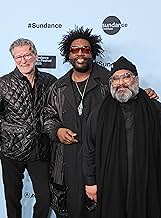Sly Lives! (aka the Burden of Black Genius)
- 2025
- 1h 52min
VALUTAZIONE IMDb
7,6/10
1277
LA TUA VALUTAZIONE
Si concentra sulla vita e l'eredità di Sly and the Family Stone, raccontando la storia dietro l'ascesa, il regno e la scomparsa di uno degli artisti più influenti della musica pop.Si concentra sulla vita e l'eredità di Sly and the Family Stone, raccontando la storia dietro l'ascesa, il regno e la scomparsa di uno degli artisti più influenti della musica pop.Si concentra sulla vita e l'eredità di Sly and the Family Stone, raccontando la storia dietro l'ascesa, il regno e la scomparsa di uno degli artisti più influenti della musica pop.
- Candidato a 1 Primetime Emmy
- 4 candidature totali
Sly Stone
- Self - Singer, Sly & The Family Stone
- (filmato d'archivio)
Cynthia Robinson
- Self - Trumpet, Sly & The Family Stone
- (filmato d'archivio)
Recensioni in evidenza
Sly stone was a genius, a tremendous success from 1968-1972, and a pioneer of multiracial rock funk & pop.
His greatest hits lp is beyond great.
Unfortunately his career was derailed by drugs booze and not showing up for live gigs, destroying the band and ultimately Sly himself. Ironically, sly worked very hard for ten years to attain his success by showing up on time and being there. His unraveling remains one of the mercurial questions of rock history.
That he was an all time great, there is little question. Sly and the Family Stone were inducted into the rock n roll HOF in 1993.
Sly is still living. He should be touring like Dylan, but he chooses not to. He remains an enigma within a riddle.
His greatest hits lp is beyond great.
Unfortunately his career was derailed by drugs booze and not showing up for live gigs, destroying the band and ultimately Sly himself. Ironically, sly worked very hard for ten years to attain his success by showing up on time and being there. His unraveling remains one of the mercurial questions of rock history.
That he was an all time great, there is little question. Sly and the Family Stone were inducted into the rock n roll HOF in 1993.
Sly is still living. He should be touring like Dylan, but he chooses not to. He remains an enigma within a riddle.
This is better than nothing of course and I must say that if it wasn't for quest love, this documentary probably wouldn't have been made. At the same time he ruined to some degree what could've been a stellar documentary. Quest love's personal theory about the burden of being a black genius, doesn't make any sense nor was it needed. Especially when you're trying to push the narrative that Sly was one of the first people to undergo it publicly as if Little Richard and James Brown and Chuck Berry didn't exist. There's a case to be made that the directors views completely contradict that of sly stone and you can clearly see that there's a clash there. I pray to God, someone comes along, and does a better documentary where Sly is telling his own story. The idea that black artists deserve to enjoy the fruits of their labor and die with their kids around them while plenty ignoring that those same black artists were irresponsible with their money and chose drugs over being responsible parents, is trick knowledge.
This is fine and will do the job as placeholder. It's in the standard format of blending clips, stills, archive footage, with contamporaries being interviewed, to take us through a famous life, the ups and downs and perhaps lessons involved.
Here it's Sly Stone, who oould have been a Prince of sorts. Theatric, multifaceted, but it was the civil rights years, and his creative life mirrors that trajectory; ebullient hope to transcend boundaries, to bitterly dashed dreams.
One lesson, and it's generally offered, is that there was no scaffold, blueprint, on which to know what to do build next, how to play the role of superstar. He, along with everybody else, had to make it up as they went along. Another talking point here is 'black' genius, the particular tolls of it in a world where boundaries are drawn starkly against you.
There may be parallels with someone like Brian Wilson; 'genius' in being able to perceive music as visual world, as shared streets you explore, but limited in the means, work, and focused commitment required to consistently bring it to life.
At least his Riot album is as important as anything from the time, a dissonant extended improvisation on previous fabric of soul music, and that as mirroring a dissonant collapsing America. It's probably a cornerstone for all black music that followed.
My own takeaway is of a man who in terms of vision was second to none of the greats of the era; adept at improvising self, savvy enough to be able to see the larger fabric.
But there's no real stage for him to move to, fails to transcend, and probably had plenty of reasons against him. The drugs were probably ways to dissociate, make believe he was what he couldn't summon. So he periodically returns as caricature of himself, clowning it for the camera, unsure how to be the next version of himself.
Meanwhile, just as he was cratering, Bronx and Harlem youths were rediscovering him in record stores, and were about to speak once more about what he used to; the world of stark limits, and yet somehow joyful dance, ironically cruising through cracks. Interestingly, the new music, hip hop, would eschew the whole band format, and pare it down to narrator and rousing, sometimes soulful breaks that suggest world.
Here it's Sly Stone, who oould have been a Prince of sorts. Theatric, multifaceted, but it was the civil rights years, and his creative life mirrors that trajectory; ebullient hope to transcend boundaries, to bitterly dashed dreams.
One lesson, and it's generally offered, is that there was no scaffold, blueprint, on which to know what to do build next, how to play the role of superstar. He, along with everybody else, had to make it up as they went along. Another talking point here is 'black' genius, the particular tolls of it in a world where boundaries are drawn starkly against you.
There may be parallels with someone like Brian Wilson; 'genius' in being able to perceive music as visual world, as shared streets you explore, but limited in the means, work, and focused commitment required to consistently bring it to life.
At least his Riot album is as important as anything from the time, a dissonant extended improvisation on previous fabric of soul music, and that as mirroring a dissonant collapsing America. It's probably a cornerstone for all black music that followed.
My own takeaway is of a man who in terms of vision was second to none of the greats of the era; adept at improvising self, savvy enough to be able to see the larger fabric.
But there's no real stage for him to move to, fails to transcend, and probably had plenty of reasons against him. The drugs were probably ways to dissociate, make believe he was what he couldn't summon. So he periodically returns as caricature of himself, clowning it for the camera, unsure how to be the next version of himself.
Meanwhile, just as he was cratering, Bronx and Harlem youths were rediscovering him in record stores, and were about to speak once more about what he used to; the world of stark limits, and yet somehow joyful dance, ironically cruising through cracks. Interestingly, the new music, hip hop, would eschew the whole band format, and pare it down to narrator and rousing, sometimes soulful breaks that suggest world.
Wow! Absolutely phenomenal storytelling of the rise, fall and everlasting impact of the musical genius, Sly Stone! This documentary poses the question, is Black Genius a burden? That is, did society's attempt to pigeonhole Sly Stone to be THE SPOKESPERSON/CELEBRITY for the Black community, who is expected to align to the Black struggle/issues, create inner turmoil that led to Sly Stone's emotional and physical breakdown and musical retreat. Some of those interviewed think that may have been the case. White artists, on the other hand, have freedom to experiment with different musical genres and different personas (think David Bowie/ Ziggy Stardust), and Madonna (and her many reincarnations), without having to walk this line of aligning their celebrity/music to be THE-SPOKESPERSON for their communities. Thus, did this duality become a burden that contributed to Sly's insecurities, drug-fueled lifestyle and ultimate downfall? Questlove does a great job of trying to answer the question and highlighting Sly Stone's musical genius. He documents his rise from a San Francisco DJ to a true trailblazer in forming a multi- racial, male/female band that fuses, rock, R&B, and the Brits sound. Questlove opens the vault and presents a treasure of archival tapes and interviews with Sly Stone and his band. And there are plenty of current interviews with the band members and musical artists who have been heavily influenced by Sly Stone. It's evident Sly will and has had a lasting impression on the world of music and many musical protégés, including Prince and many rappers, who are still sampling his music today. The documentary ends on a bittersweet note, as Sly Stone is shown as he is today. A frail, elderly man, who is pictured alone and with his children and grandkids. However, his music is forever. Sly Lives!
As "Sly Lives! (aka the Burden of Black Genius)" (2025 release; 112 min) opens, talking heads are gushing about how revolutionary Sly & the Family Stone was (multi-racial! Multi-gendered! Irresistible music!). The film's director then asks prominent Black artists what they think about the burden of Black genius. We then go to "San Francisco 1964", where Sly is a well-known and beloved DJ. At this point we are 10 minutes into the documentary.
Couple of comments: this is the second documentary from musician Questlove, whose first documentary "Summer pf Love" won the Oscar for best documentary. Here the Roots drummer assesses the life and times of Sly Stone, who in the late 60s shot out of nowhere like a comet to the very top of the music world and stayed there for a couple of years, only then to fade away rather quickly. (Sly & the Family Stone also feature prominently in the "Summer of Soul" documentary.) One of THE highlights for me was to see how the song "Everyday People" evolved from a slow and quiet song in its early stages to the exuberant iconic singalong as we all know it now. The film features tons of obscure footage, as well as plenty of comments from various talking heads (including Sly's 3 children and several of his ex-es). For a couple of years, Sly & the Family Stone ruled the airwaves and the concert scene. As the movie makes clear, with Sly & the Family Stone, there likely would not be Prince & the Revolution. And without "Thank You", there would be no Janet Jackson's "Rhythm Nation". And that's just 2 examples how influential Sly has been. If you have seen "Summer of Soul", one of the finest music documentaries I have ever seen, beware that "Sly Lives!" is quite good, but not the truly gold standard that was/is "Summer of Soul".
"Sly Lives! (aka the Burden of Black Genius) premiered at this year's Sundance Film Festival to immediate acclaim. It started streaming on Hulu just last week, and I watched it the other night. This is currently rated 80% Certified Fresh on Rotten Tomatoes, a tad too generous in my book. All that aside, if you are a fan of Sly Stone, or liked "Summer of Soul", I'd readily suggest you check this out, and draw your own conclusions.
Couple of comments: this is the second documentary from musician Questlove, whose first documentary "Summer pf Love" won the Oscar for best documentary. Here the Roots drummer assesses the life and times of Sly Stone, who in the late 60s shot out of nowhere like a comet to the very top of the music world and stayed there for a couple of years, only then to fade away rather quickly. (Sly & the Family Stone also feature prominently in the "Summer of Soul" documentary.) One of THE highlights for me was to see how the song "Everyday People" evolved from a slow and quiet song in its early stages to the exuberant iconic singalong as we all know it now. The film features tons of obscure footage, as well as plenty of comments from various talking heads (including Sly's 3 children and several of his ex-es). For a couple of years, Sly & the Family Stone ruled the airwaves and the concert scene. As the movie makes clear, with Sly & the Family Stone, there likely would not be Prince & the Revolution. And without "Thank You", there would be no Janet Jackson's "Rhythm Nation". And that's just 2 examples how influential Sly has been. If you have seen "Summer of Soul", one of the finest music documentaries I have ever seen, beware that "Sly Lives!" is quite good, but not the truly gold standard that was/is "Summer of Soul".
"Sly Lives! (aka the Burden of Black Genius) premiered at this year's Sundance Film Festival to immediate acclaim. It started streaming on Hulu just last week, and I watched it the other night. This is currently rated 80% Certified Fresh on Rotten Tomatoes, a tad too generous in my book. All that aside, if you are a fan of Sly Stone, or liked "Summer of Soul", I'd readily suggest you check this out, and draw your own conclusions.
Lo sapevi?
I più visti
Accedi per valutare e creare un elenco di titoli salvati per ottenere consigli personalizzati
Dettagli
- Data di uscita
- Paese di origine
- Lingua
- Celebre anche come
- Sly Lives! El legado de un genio
- Aziende produttrici
- Vedi altri crediti dell’azienda su IMDbPro
- Tempo di esecuzione
- 1h 52min(112 min)
- Colore
- Mix di suoni
Contribuisci a questa pagina
Suggerisci una modifica o aggiungi i contenuti mancanti





































